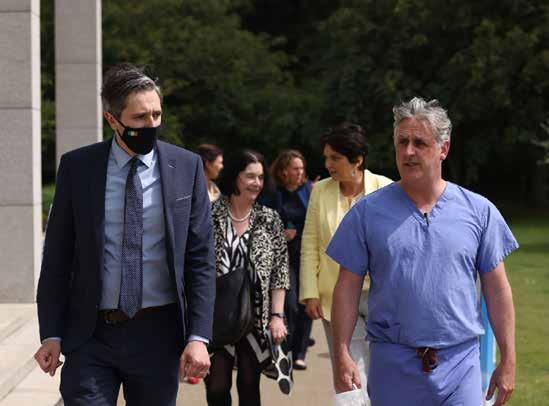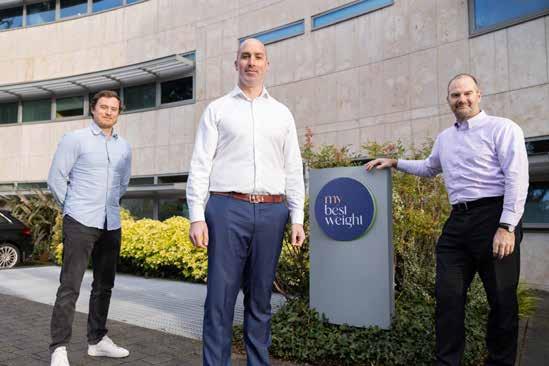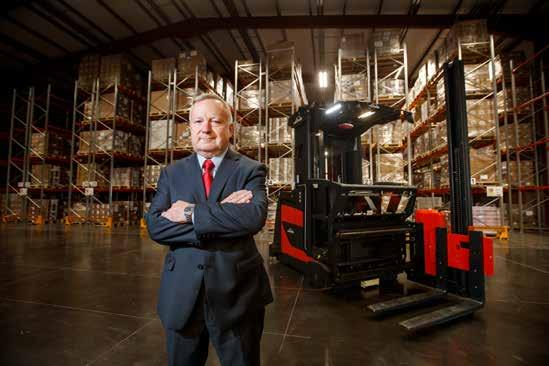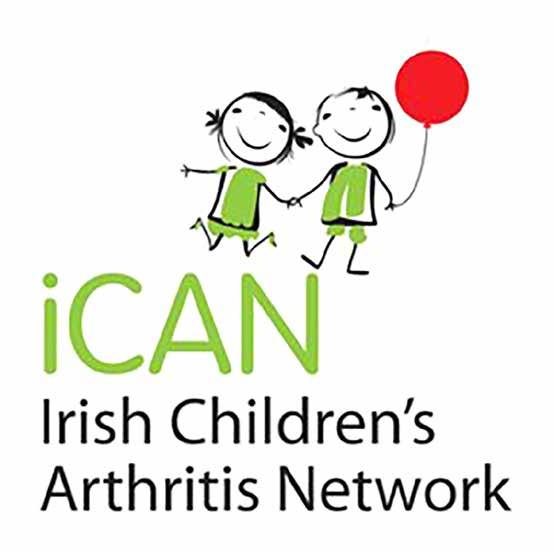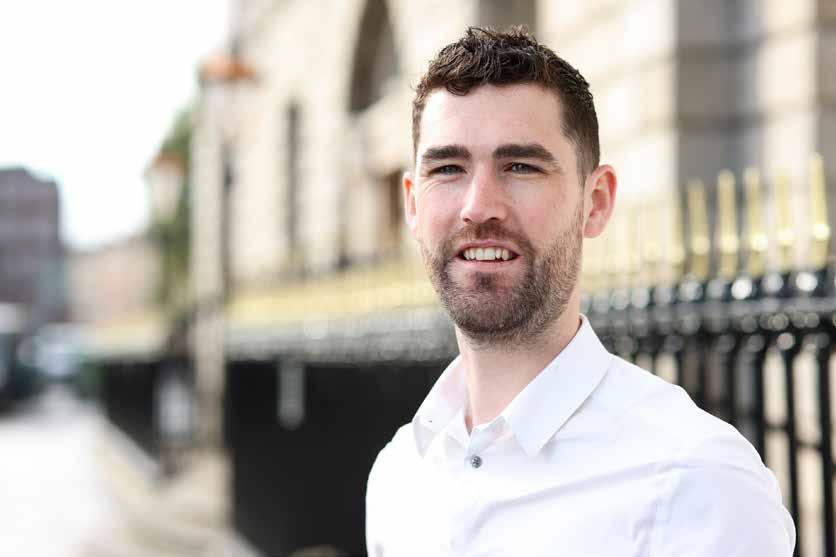
14 minute read
New Medicines Supply Agreement reached
10
Medicine Report New Medicines Supply Agreement
Four-year Agreement reached between international researchbased biopharmaceutical industry and the State.
The Minister for Health, Stephen Donnelly TD, has announced two new Framework Agreements on Pricing and Supply of Medicines 2021-2025.
The multiannual agreements with the Irish Pharmaceutical Healthcare Association (IPHA) and Medicines for Ireland (MFI) represent an important step in reducing the cost of medicines and improving access to innovative new medicines for patients.
The new deals will deliver:
• improved access for patients to new and innovative medicines
• reductions in the cost of existing medicines
• an easing of financial pressure on the health services into the future
It is estimated that this will result in the State paying between ¤600 million and ¤700 million less for medicines than it would otherwise.
The four-year Framework Agreement on the Supply and Pricing of Medicines, agreed between the research-based industry and the State, takes effect from January 1, 2022. It means that medicines, brought forward by the research-based biopharmaceutical industry after years of research and development, will be available to patients faster through an improved funding framework. Padraic O’Brien, Chairperson, Medicines for Ireland commented, ‘We welcome the new Supply and Pricing of Medicines Framework announced by Minister Donnelly. We believe, as the representative of the companies who supply the majority of medicines in Ireland daily, this agreement will bring increased patient access to generic and biosimilar medicines in Ireland, offering patients and healthcare professionals more choice, and yielding substantial savings to the State over the years ahead.” Director David Delaney echoed these sentiments adding, “This is a transformational agreement that will ensure even greater access to generic and biosimilar medicines in Ireland. The Minister, the HSE, the Department of Health and our member companies have worked tirelessly to make this new Agreement a reality, ensuring the focus remained on patient access to medicines. The Agreement is a positive step forward, bringing patients in Ireland earlier access to best value biosimilar and generic medicines in their patient journey.” Next year, IPHA member companies expect to propose about 35 innovative new medicines for a range of medical conditions, including arthritis, multiple sclerosis, psoriasis, spinal muscular atrophy and many forms of cancer. These medicines would treat almost 17,500 patients. The ¤30 million for new medicines, announced by the Government in Budget 2022, will help to give more patients access to new treatments in the innovation pipeline. Over the four years of the Agreement, the research-based industry expects to propose over 170 innovative new medicines. The new Agreement means there will be an improved funding framework in place to support the Health Service Executive’s reimbursement process and growth in the availability of innovative new medicines.
The research-based biopharmaceutical industry has agreed to staged increases in rebates to the State on sales of

on-patent and off-patent unique medicines, rising from 5.5% this year to reach 9% in October 2024. The industry will deliver about ¤89 million in rebates in that period. When combined with price discounts on off-patent medicines that have market competitors and with price realignment measures, IPHA calculates the value of efficiencies over four years at between ¤700 million and ¤800 million.
The research-based industry believes the Agreement provides for adequate, sustained investment in innovative new medicines, with allocations decided annually based on horizon scanning and the budgetary process. IPHA will monitor, and contribute towards, the achievement of an improved timeline between a company’s application for reimbursement of a new medicine in the health services, with the State committing to resourcing the reimbursement system sufficiently for the timely processing of applications. Our analysis shows that it has taken more than three years to reimburse some innovative new medicines.
The State has committed to increasing the number of HSE Drugs Group reimbursement decision-making slots. These are expected to total between 50 and 60 annually. That would represent an increase in the number of slots of between 35% and 62% over 2020. The move is a capacity-building measure that should improve the flow of clinically beneficial innovative new medicines to the health services.
The most recent data, gathered annually by health analysts IQVIA for EFPIA, the research-based biopharmaceutical industry’s European representative organisation, shows that, among western European countries, only France and Portugal are slower than Ireland in making innovative new medicines available to patients. Patients in Germany get “The Agreement is a positive step forward, bringing patients in Ireland earlier access to best value biosimilar and generic medicines in their patient journey”
David Delaney, Director, Medicines for Ireland

The Agreement provides a platform for helping to raise healthcare standards through a steady, continuous flow of innovative new medicines that emerge from years of research and development. The announcement by the Government of ¤30 million for new medicines in Budget 2022 was a welcome step towards improving the funding environment”
Paul Reid, President, IPHA
innovative new medicines four times faster than in Ireland. Among 34 European countries surveyed, Ireland places 18th. There will be no change in the 14 European countries used to calculate medicines prices in Ireland. This ‘reference basket’ comprises Austria, Belgium, Denmark, Finland, France, Germany, Greece, Italy, Luxembourg, the Netherlands, Portugal, Spain, Sweden and the UK.
The research-based biopharmaceutical industry believes the new Agreement has the potential to improve the operating environment for the adoption of innovative new medicines in the health services. That will improve health outcomes, with medicines shown to contribute to lower mortality rates and better survival rates for a range of conditions including heart disease, stroke, cancer and many more. Paul Reid, President of IPHA, said, “The Agreement is the product of joint working with the State. We need to find ways to get innovative new medicines to patients faster while, at the same time, managing affordability challenges with the State. The Agreement provides a platform for helping to raise healthcare standards through a steady, continuous flow of innovative new medicines that emerge from years of research and development. I hope the researchbased biopharmaceutical industry and the State can continue to work in partnership in areas like horizon scanning and shorter times to reimbursement decisions so that we can adopt innovation faster in the health services. The announcement by the Government of ¤30 million for new medicines in Budget 2022 was a welcome step towards improving the funding environment. “We are putting in place the conditions for Ireland to adopt innovative new medicines faster, complementing the strength of the research-based biopharmaceutical manufacturing sector across the regions. We want to help to close the gap between scale and speed - that Ireland can have a significant international biopharmaceutical footprint and fast adoption of innovative new medicines in the health services.”
The biopharmaceutical sector is among Ireland’s strongest industrial performers, including during the pandemic. Rising exports and strong corporate tax receipts are helping to generate Exchequer revenues and economic activity across the regions. The sector accounts for some 45,000 jobs and generates almost ¤15 billion in gross value-added for the economy annually. Advancements in medicines have helped to extend life expectancy which climbed by 25 years for men and by 29 for women between 1911 and 2011. In cancer, five-year survival rates have improved dramatically. The mortality rate for heart attacks dropped by 51% between 2008 and 2018. Thousands of treatments are in development globally to tackle unmet medical needs across a range of therapy areas. In Invest In Our Futures, the IPHA campaign in the run-up to the new Agreement and Budget 2022, we highlighted this progress in medicines. Oliver O’Connor, Chief Executive of IPHA added, “The Agreement, and the policy behind it, supports innovation by making clear distinctions between savings measures affecting patentprotected medicines and offpatent, non-exclusive medicines. It provides for significant price reductions for non-exclusive medicines. Our companies support robust competition on a level playing field. “IPHA member companies discover, develop, manufacture and supply new medicines, bringing to patients the product of research and development that is enabled by a stable intellectual property framework. Over the lifetime of this Agreement, we expect to launch more than 170 innovative new medicines for serious medical “As the world of medicines innovation turns, Ireland should be a strong performer across all stages of the lifecycle - discovery, development, manufacturing and adoption. Let us resolve to do our best in each of them”
Oliver O’Connor, Chief Executive, IPHA

conditions. We now have the basis for making innovative new medicines available to patients faster than before.
“So, clinically, this Agreement can be a milestone in the delivery of new treatment options. Economically, too, we know that medicines are productive investments, with more people staying active in the workforce for longer and, potentially, avoiding long-term hospitalisations. As the world of medicines innovation turns, Ireland should be a strong performer across all stages of the lifecycle - discovery, development, manufacturing and adoption. Let us resolve to do our best in each of them.”
News
The second Implementation Plan for Activity Based Funding (ABF) in Ireland has just been published, as part of a programme of work to support the delivery of the Sláintecare Implementation Strategy.
This Plan represents an important step forward in increasing transparency in funding, encouraging efficiency, value for money and sustainability, and ultimately providing greater accountability for the way resources are allocated in the Irish healthcare system.
Since the Government committed to introducing ABF in 2012, they have worked to build the skillsets and underlying data needed to do this, and to establish an annual price development cycle to support funding decisions. The first Implementation Plan (2015) laid the groundwork for this with the establishment of the Healthcare Pricing Office (HPO) centrally within the Health Service Executive (HSE) and the development of patientlevel costing at 19 hospitals. 39 hospitals have been funded by ABF for 70% of their total funding, moving away from historic block funding and increasing transparency and accountability.
In 2018 the Government reconfirmed its commitment to ABF as part of the Sláintecare Implementation Strategy and included actions in the Strategy to progress ABF. This second ABF Implementation Plan provides a vehicle to continue to progress these actions including preparatory work around introduction of structured healthcare purchasing, taking foundational steps towards the necessary costing and data improvements needed to support pricing for community services, and building on the work already undertaken to further expand and enhance the costing and pricing of hospital services.
This Plan signals a shift from the necessary foundational and technical work around the costing and pricing of services towards creating a more holistic healthcare resourcing and purchasing process that links insights from key clinical, operational and patient stakeholders, with the core Sláintecare intent around integrated care, in the least complex setting appropriate, as close to home as practical. system and has created major challenges for in accounting for new and unknown patterns of healthcare usage and costs. Whilst emergency measures have included temporary increases to block funding, ABF and its building blocks have proved useful in providing the information needed to monitor the impact and effects of the disease and make important decisions as to where resources should be deployed, and will continue to be critical for health system insights and funding into the future.
Many aspects of the changes introduced over the last 21 months are fully consistent with the intent of Sláintecare, and will be maintained after the pandemic has ended.
HospitalBuddy delivers Digital Solution
HospitalBuddy is a free mobile phone app and website developed by a team of hospital doctors working throughout Ireland. At the start of the Covid pandemic, a team of doctors around Ireland recognised that there was a clinical need for increased digital solutions for Irish based hospital doctors. The group initially consisted of 15 consultants and registrars including surgeons, paediatricians, obstetricians, physicians and intensivists working throughout Ireland who amalgamated content for the HospitalBuddy platform. We partnered with an experienced MedTech software development team who have previously designed three highly successful medical websites in Ireland – GPBuddy.ie, PharmaBuddy.ie and Medcafe.ie.
The aim of the HospitalBuddy platform was to develop an interface for doctors and frontline health workers to streamline several of their daily clinical pinch points into one app and website. HospitalBuddy has several integrated features to help doctors working in hospitals across Ireland including: • the ability to digitally track internal hospital CPD meetings
• regular updates on national medical educational meetings
• medical educational flashcards & infographics
• a discussion forum for each hospital and a separate national
NCHD discussion forum
• a database of over 200 printable patient information leaflets
To date there are over 1,000 hospital doctors in Ireland using the app regularly. To achieve this milestone, we were greatly assisted by the Health Innovation Hub (HIHI) who helped us to roll out our internal CPD meeting tracking system to a number of hospitals across the country. As a result of the Covid pandemic, it has become increasingly difficult for hospital administrators to keep a record of those attending meetings in person and those attending virtually. Whether the doctor is attending in person or virtually, they can track their attendance via the HospitalBuddy app using a specific PIN password for each meeting. Hospital administrators can also track attendance of doctors to these meetings and can print out a copy of each doctor’s attendance at the end of the academic year. The Clinical Resources section of the HospitalBuddy platform contains a large list of infographics, educational flashcards and material relevant to keeping up to date as medical information rapidly evolves. Our Consultant team are constantly emailing new and useful information for this section of the app. The Educational Resources section contains over 60 online medical lectures and educational podcasts given mainly by Consultants around Ireland. We have partnered with Medcafe.ie to organise live online streams of medical meetings and SpR study days. These meetings are also recorded so doctors can watch the recordings in their own time. We have had some excellent speakers both nationally and internationally on the app recently, such as Dr Mark Levy, the co-author of the GINA guidelines lecturing on Asthma. HospitalBuddy offers users at each hospital a dedicated discussion forum that can be accessed by doctors who work at that hospital. We are currently working with medical manpower teams to facilitate sharing of key messages from the Medical Manpower team to doctors working in their hospital via the app. On the ground, NCHDs have found the ability to let new NCHDs starting in their hospital know about everything from membership exam teaching sessions to extracurricular activities particularly helpful using the Hospital discussion forum also. We also offer a National NCHD discussion forum which is particularly helpful to NCHDs who can discuss the many issues facing NCHDs nationally– for example, discussions on contracts, medical indemnity and tips about revenue returns for NCHDs by NCHDs.
Written by Dr Oisin O'Connell, MD, FRCPI, Respiratory Consultant Bon Secours Hospital Cork; Senior Medical Lecturer UCC

Following on from an awardwinning project by Dr Jessica McCarthy who developed a National Irish Thoracic Society endorsed Patient Information Leaflet on solitary pulmonary nodules, HospitalBuddy is developing a national database of patient information leaflets commonly used by Consultants across Ireland, with the support of the UCC Medtech Society and UCC medical student Adina Zago. To date we have built a database of over 200 printable patient information leaflets filterable by clinical specialty. We anticipate this database to continuously grow and have made it particularly easy for doctors to print these patient information handouts by not requiring a login to print them from our website. We are seeing doctors in emergency departments and outpatient clinics printing out these patient information handouts which address the most common clinical queries and helps doctors have extra time in clinic to cover the areas these approved patient education handouts do not cover.
Recently, several hospitals have emailed us their phone directories and NCHD handbooks for the Hospital Resources section of the app. This has saved doctors hours trying to ring switchboards just to get an internal ward phone number. Our support team have also created a directory of useful hospital switchboard numbers for doctors trying to get through to other hospitals. The HospitalBuddy app has been recently supported by the Medical Protection Society (MPS) in Ireland who recognise that by making clinical information and medical education more readily available to doctors, HospitalBuddy will help to reduce clinical risks and help standardise care to conform to best international practices. We are also collaborating with the NDTP, the HIHI and hospital medical administration teams to develop further solutions to address key needs facing hospital doctors and hospital admin staff in Ireland. The app can be downloaded free using the links below. Feel free to email our support team at support@hospitalbuddy.ie with any resources, internal hospital phone directories or speciality guidelines you feel we should add to the platform. We are always looking to learn and share at the HospitalBuddy team. Android users can download the HospitalBuddy app using: https://play.google.com/ store/apps/details?id=com. cmemeetingsltd.cpdplanner Apple users can download the HospitalBuddy app using: https://apps.apple.com us/app/ cpdplanner/id1484966217

